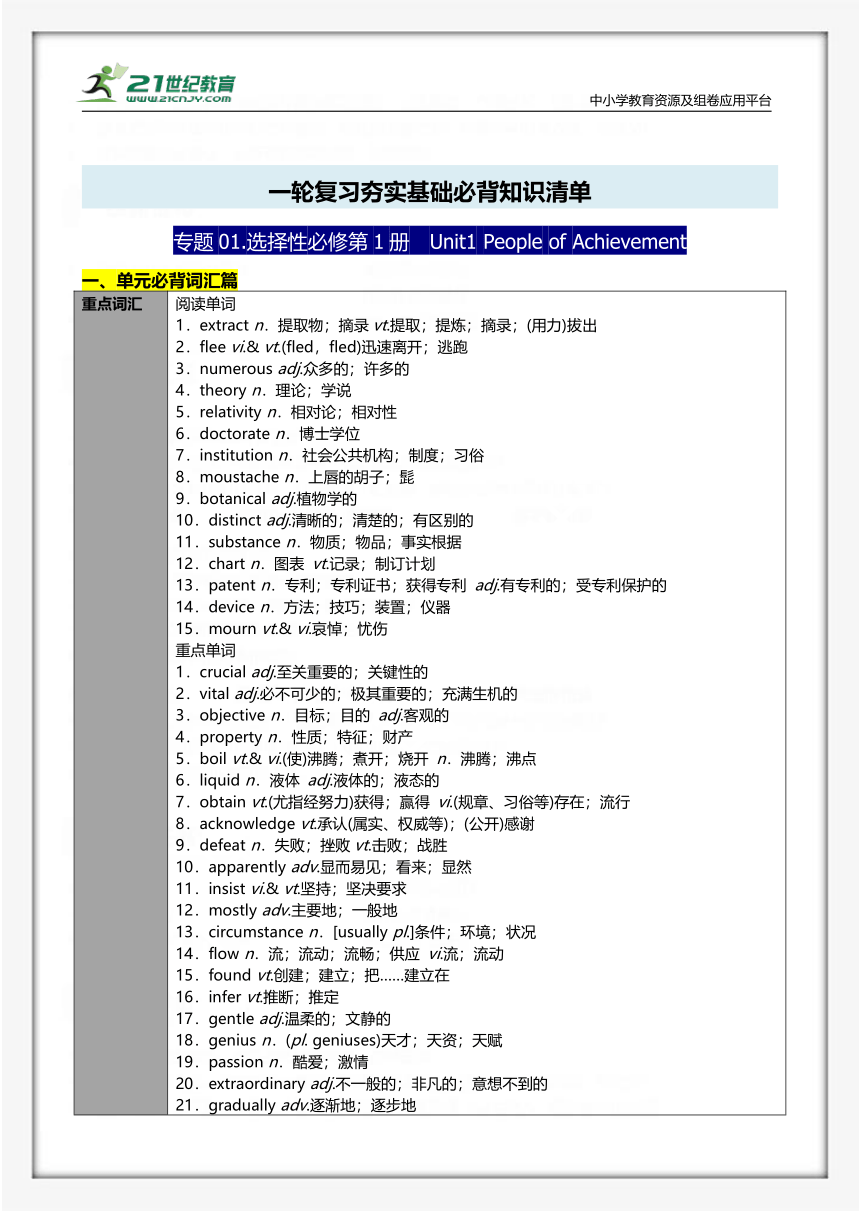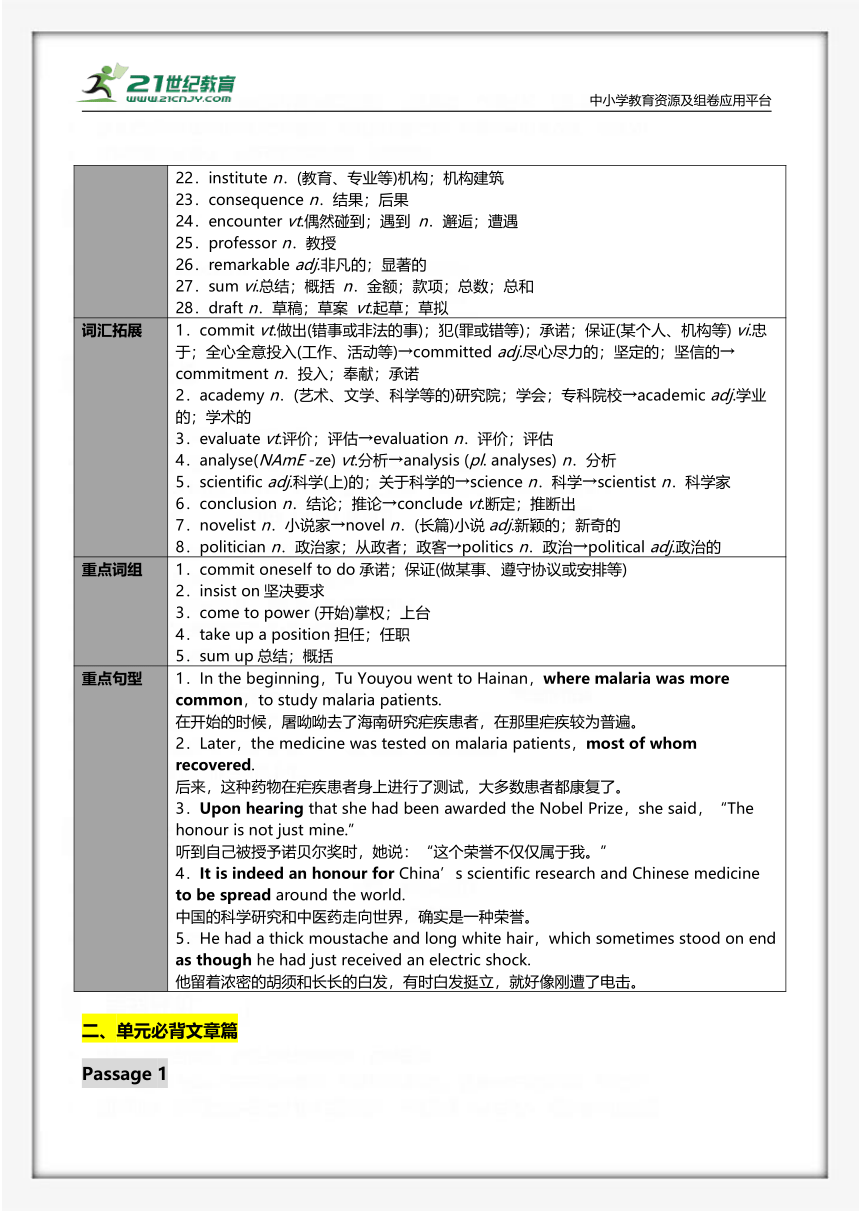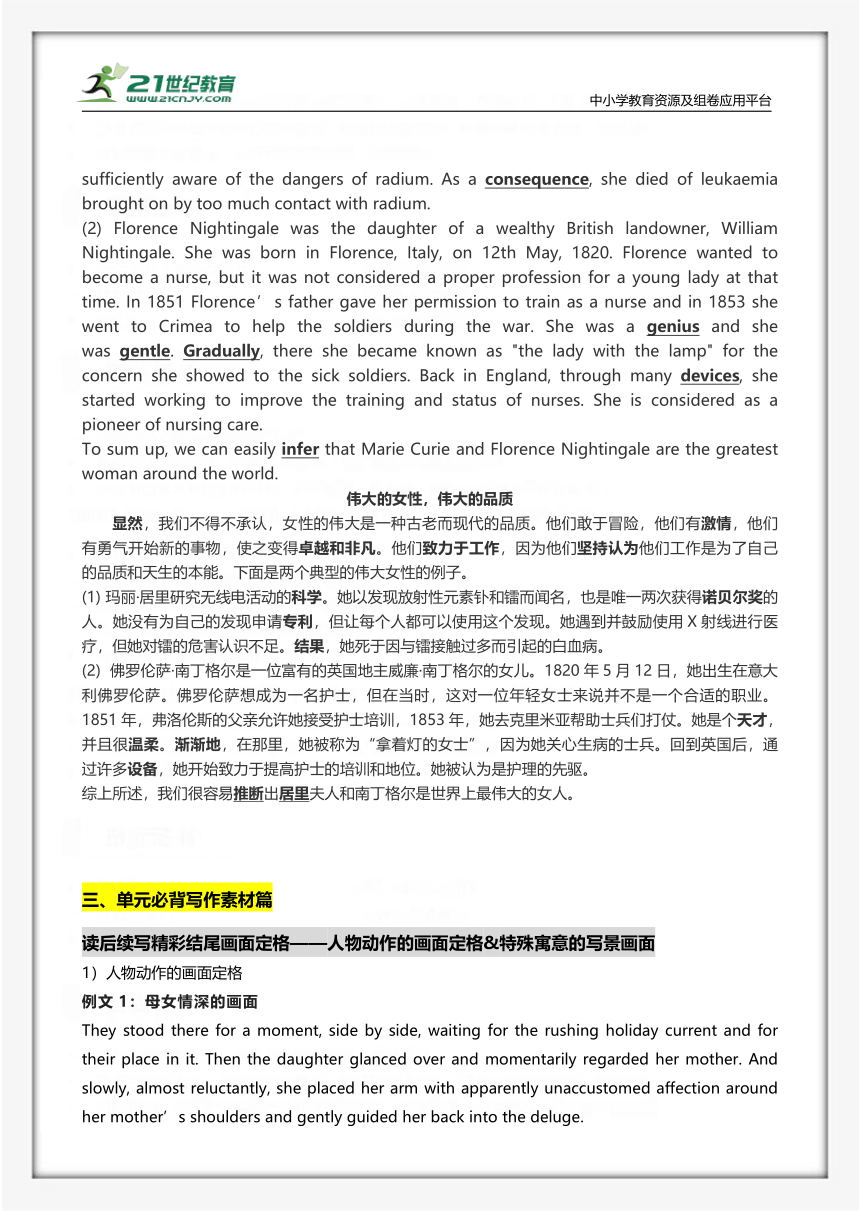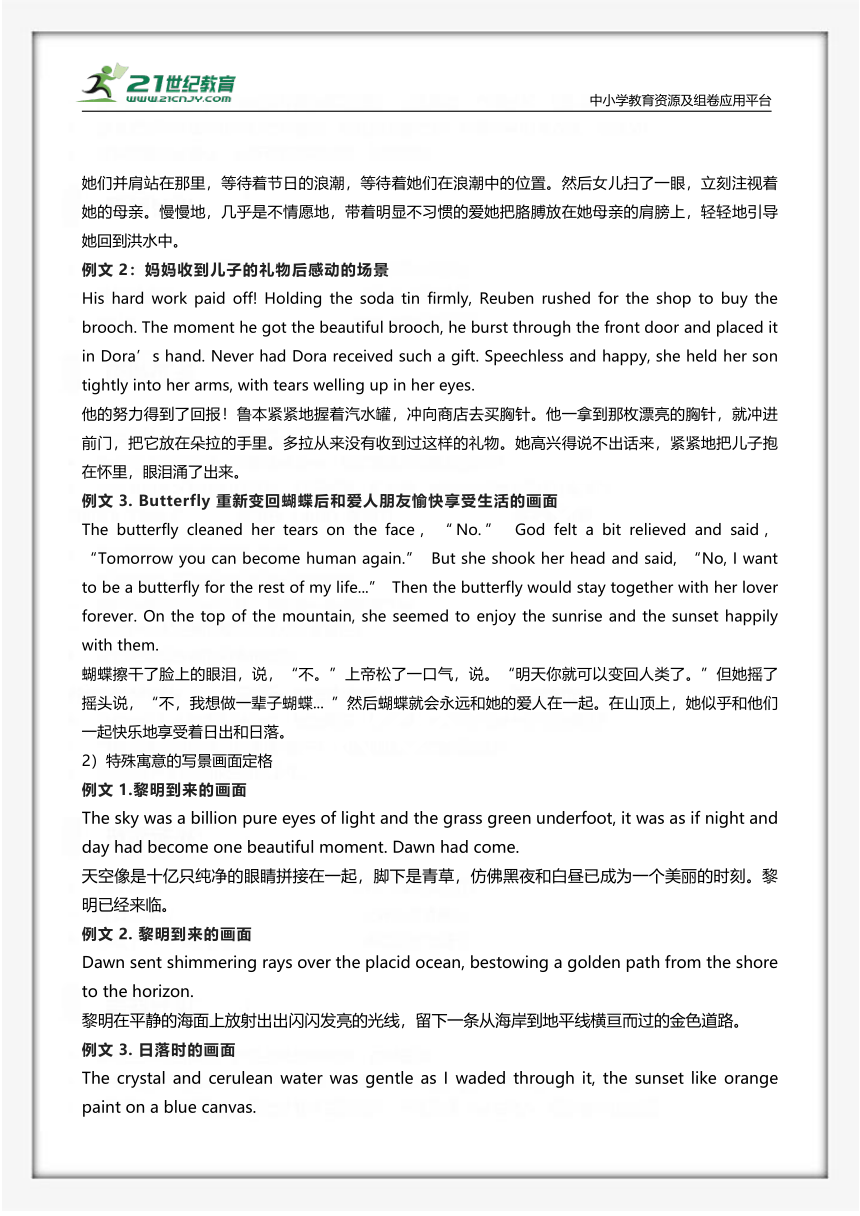(人教版2019)高考英语 一轮复习夯实基础必背知识清单 专题01. 选择性必修第1册 Unit1 People of Achievement
文档属性
| 名称 | (人教版2019)高考英语 一轮复习夯实基础必背知识清单 专题01. 选择性必修第1册 Unit1 People of Achievement |

|
|
| 格式 | docx | ||
| 文件大小 | 120.5KB | ||
| 资源类型 | 试卷 | ||
| 版本资源 | 人教版(2019) | ||
| 科目 | 英语 | ||
| 更新时间 | 2022-11-18 17:24:18 | ||
图片预览





文档简介
中小学教育资源及组卷应用平台
一轮复习夯实基础必背知识清单
专题01.选择性必修第1册 Unit1 People of Achievement
一、单元必背词汇篇
重点词汇 阅读单词 1.extract n.提取物;摘录vt.提取;提炼;摘录;(用力)拔出 2.flee vi.& vt.(fled,fled)迅速离开;逃跑 3.numerous adj.众多的;许多的 4.theory n.理论;学说 5.relativity n.相对论;相对性 6.doctorate n.博士学位 7.institution n.社会公共机构;制度;习俗 8.moustache n.上唇的胡子;髭 9.botanical adj.植物学的 10.distinct adj.清晰的;清楚的;有区别的 11.substance n.物质;物品;事实根据 12.chart n.图表 vt.记录;制订计划 13.patent n.专利;专利证书;获得专利 adj.有专利的;受专利保护的 14.device n.方法;技巧;装置;仪器 15.mourn vt.& vi.哀悼;忧伤 重点单词 1.crucial adj.至关重要的;关键性的 2.vital adj.必不可少的;极其重要的;充满生机的 3.objective n.目标;目的 adj.客观的 4.property n.性质;特征;财产 5.boil vt.& vi.(使)沸腾;煮开;烧开 n.沸腾;沸点 6.liquid n.液体 adj.液体的;液态的 7.obtain vt.(尤指经努力)获得;赢得 vi.(规章、习俗等)存在;流行 8.acknowledge vt.承认(属实、权威等);(公开)感谢 9.defeat n.失败;挫败vt.击败;战胜 10.apparently adv.显而易见;看来;显然 11.insist vi.& vt.坚持;坚决要求 12.mostly adv.主要地;一般地 13.circumstance n.[usually pl.]条件;环境;状况 14.flow n.流;流动;流畅;供应 vi.流;流动 15.found vt.创建;建立;把……建立在 16.infer vt.推断;推定 17.gentle adj.温柔的;文静的 18.genius n.(pl. geniuses)天才;天资;天赋 19.passion n.酷爱;激情 20.extraordinary adj.不一般的;非凡的;意想不到的 21.gradually adv.逐渐地;逐步地 22.institute n.(教育、专业等)机构;机构建筑 23.consequence n.结果;后果 24.encounter vt.偶然碰到;遇到 n.邂逅;遭遇 25.professor n.教授 26.remarkable adj.非凡的;显著的 27.sum vi.总结;概括 n.金额;款项;总数;总和 28.draft n.草稿;草案 vt.起草;草拟
词汇拓展 1.commit vt.做出(错事或非法的事);犯(罪或错等);承诺;保证(某个人、机构等) vi.忠于;全心全意投入(工作、活动等)→committed adj.尽心尽力的;坚定的;坚信的→commitment n.投入;奉献;承诺 2.academy n.(艺术、文学、科学等的)研究院;学会;专科院校→academic adj.学业的;学术的 3.evaluate vt.评价;评估→evaluation n.评价;评估 4.analyse(NAmE -ze) vt.分析→analysis (pl. analyses) n.分析 5.scientific adj.科学(上)的;关于科学的→science n.科学→scientist n.科学家 6.conclusion n.结论;推论→conclude vt.断定;推断出 7.novelist n.小说家→novel n.(长篇)小说adj.新颖的;新奇的 8.politician n.政治家;从政者;政客→politics n.政治→political adj.政治的
重点词组 1.commit oneself to do承诺;保证(做某事、遵守协议或安排等) 2.insist on坚决要求 3.come to power (开始)掌权;上台 4.take up a position担任;任职 5.sum up总结;概括
重点句型 1.In the beginning,Tu Youyou went to Hainan,where malaria was more common,to study malaria patients. 在开始的时候,屠呦呦去了海南研究疟疾患者,在那里疟疾较为普遍。 2.Later,the medicine was tested on malaria patients,most of whom recovered. 后来,这种药物在疟疾患者身上进行了测试,大多数患者都康复了。 3.Upon hearing that she had been awarded the Nobel Prize,she said,“The honour is not just mine.” 听到自己被授予诺贝尔奖时,她说:“这个荣誉不仅仅属于我。” 4.It is indeed an honour for China’s scientific research and Chinese medicine to be spread around the world. 中国的科学研究和中医药走向世界,确实是一种荣誉。 5.He had a thick moustache and long white hair,which sometimes stood on end as though he had just received an electric shock. 他留着浓密的胡须和长长的白发,有时白发挺立,就好像刚遭了电击。
单元必背文章篇
Passage 1
In 2015, Tu Youyou was awarded the Nobel Prize for Physiology or Medicine because she discovered artemisinin, which is a crucial treatment for malaria.
Tu Youyou was born in Ningbo, China in 1930 and graduated from Peking University Medical School in 1955. In 1967, she, together with a team of scientists, began to analyse a new treatment for malaria. In 1969, as head of the project, she decided to find traditional botanical treatments for the disease from ancient Chinese medical texts. She got an inspiration from one medical text of the fourth century, which suggested using the extract from sweet wormwood to treat a fever. At first her team tested a collection of dried wormwood leaves but it didn't work. Under no circumstance did they give up their research. Then they tried boiling fresh wormwood but had no effect, either. However, she didn't acknowledge the defeat and finally found a different way to treat the wormwood. She drew out the extract from the wormwood at a lower temperature and found a substance that worked.
Luckily, her team finally succeeded in 1971 and the medicine,which was called artemisinin, soon became a standard treatment for malaria, which is a great property for human beings.
2015年,屠呦呦被授予诺贝尔生理学或医学奖,因为她发现了青蒿素,青蒿素是治疗疟疾的关键药物。
屠呦呦1930出生于中国宁波,1955毕业于北京大学医学院。1967,她与一组科学家一起分析了一种新的疟疾治疗方法。1969年,作为该项目的负责人,她决定从中国古代医学文献中寻找治疗该病的传统植物疗法。她从四世纪的一篇医学著作中获得到了灵感,这篇文章建议用甜艾草提取物来治疗发烧。起初,她的团队测试了一批干艾草叶,但没有成功。在任何情况下,他们都没有放弃他们的研究。然后他们试着煮新鲜的艾草,但也没有效果。然而,她并不承认失败,最终找到了一个不同的方法来对待艾草。她在较低的温度下从艾草中提取提取物,发现了一种有效的物质。
幸运的是,她的团队终于在1971年取得了成功,这种名为青蒿素的药物很快成为治疗疟疾的标准药物,这是人类的一大财富。
Passage 2
Great Woman, Great Quality
Apparently, we have to admit that greatness in womanhood is an ancient and modern quality. They venture, they dare, they have passion and they have courage to begin new things to be remarkable and extraordinary. They commit themselves to work because they insist that they work for the good of their quality and inborn instincts . The following are two typical examples of great women.
(1) Marie Curie researched into the science of radio-activity. She is best known for discovering the radioactive elements - polonium and radium and as the only person to win two Nobel Prizes. She did not patent her discoveries but made them available to everyone. She encountered and encouraged the use of X-rays for medical treatment, but she was not sufficiently aware of the dangers of radium. As a consequence, she died of leukaemia brought on by too much contact with radium.
(2) Florence Nightingale was the daughter of a wealthy British landowner, William Nightingale. She was born in Florence, Italy, on 12th May, 1820. Florence wanted to become a nurse, but it was not considered a proper profession for a young lady at that time. In 1851 Florence’s father gave her permission to train as a nurse and in 1853 she went to Crimea to help the soldiers during the war. She was a genius and she was gentle. Gradually, there she became known as "the lady with the lamp" for the concern she showed to the sick soldiers. Back in England, through many devices, she started working to improve the training and status of nurses. She is considered as a pioneer of nursing care.
To sum up, we can easily infer that Marie Curie and Florence Nightingale are the greatest woman around the world.
伟大的女性,伟大的品质
显然,我们不得不承认,女性的伟大是一种古老而现代的品质。他们敢于冒险,他们有激情,他们有勇气开始新的事物,使之变得卓越和非凡。他们致力于工作,因为他们坚持认为他们工作是为了自己的品质和天生的本能。下面是两个典型的伟大女性的例子。
(1) 玛丽·居里研究无线电活动的科学。她以发现放射性元素钋和镭而闻名,也是唯一两次获得诺贝尔奖的人。她没有为自己的发现申请专利,但让每个人都可以使用这个发现。她遇到并鼓励使用X射线进行医疗,但她对镭的危害认识不足。结果,她死于因与镭接触过多而引起的白血病。
(2) 佛罗伦萨·南丁格尔是一位富有的英国地主威廉·南丁格尔的女儿。1820年5月12日,她出生在意大利佛罗伦萨。佛罗伦萨想成为一名护士,但在当时,这对一位年轻女士来说并不是一个合适的职业。1851年,弗洛伦斯的父亲允许她接受护士培训,1853年,她去克里米亚帮助士兵们打仗。她是个天才,并且很温柔。渐渐地,在那里,她被称为“拿着灯的女士”,因为她关心生病的士兵。回到英国后,通过许多设备,她开始致力于提高护士的培训和地位。她被认为是护理的先驱。
综上所述,我们很容易推断出居里夫人和南丁格尔是世界上最伟大的女人。
三、单元必背写作素材篇
读后续写精彩结尾画面定格——人物动作的画面定格&特殊寓意的写景画面
1)人物动作的画面定格
例文1:母女情深的画面
They stood there for a moment, side by side, waiting for the rushing holiday current and for their place in it. Then the daughter glanced over and momentarily regarded her mother. And slowly, almost reluctantly, she placed her arm with apparently unaccustomed affection around her mother’s shoulders and gently guided her back into the deluge.
她们并肩站在那里,等待着节日的浪潮,等待着她们在浪潮中的位置。然后女儿扫了一眼,立刻注视着她的母亲。慢慢地,几乎是不情愿地,带着明显不习惯的爱她把胳膊放在她母亲的肩膀上,轻轻地引导她回到洪水中。
例文2:妈妈收到儿子的礼物后感动的场景
His hard work paid off! Holding the soda tin firmly, Reuben rushed for the shop to buy the brooch. The moment he got the beautiful brooch, he burst through the front door and placed it in Dora’s hand. Never had Dora received such a gift. Speechless and happy, she held her son tightly into her arms, with tears welling up in her eyes.
他的努力得到了回报!鲁本紧紧地握着汽水罐,冲向商店去买胸针。他一拿到那枚漂亮的胸针,就冲进前门,把它放在朵拉的手里。多拉从来没有收到过这样的礼物。她高兴得说不出话来,紧紧地把儿子抱在怀里,眼泪涌了出来。
例文3. Butterfly 重新变回蝴蝶后和爱人朋友愉快享受生活的画面
The butterfly cleaned her tears on the face,“No.” God felt a bit relieved and said,“Tomorrow you can become human again.” But she shook her head and said, “No, I want to be a butterfly for the rest of my life...” Then the butterfly would stay together with her lover forever. On the top of the mountain, she seemed to enjoy the sunrise and the sunset happily with them.
蝴蝶擦干了脸上的眼泪,说,“不。”上帝松了一口气,说。“明天你就可以变回人类了。”但她摇了摇头说,“不,我想做一辈子蝴蝶... ”然后蝴蝶就会永远和她的爱人在一起。在山顶上,她似乎和他们一起快乐地享受着日出和日落。
2)特殊寓意的写景画面定格
例文1.黎明到来的画面
The sky was a billion pure eyes of light and the grass green underfoot, it was as if night and day had become one beautiful moment. Dawn had come.
天空像是十亿只纯净的眼睛拼接在一起,脚下是青草,仿佛黑夜和白昼已成为一个美丽的时刻。黎明已经来临。
例文2. 黎明到来的画面
Dawn sent shimmering rays over the placid ocean, bestowing a golden path from the shore to the horizon.
黎明在平静的海面上放射出出闪闪发亮的光线,留下一条从海岸到地平线横亘而过的金色道路。
例文3. 日落时的画面
The crystal and cerulean water was gentle as I waded through it, the sunset like orange paint on a blue canvas.
当我涉过水晶般天蓝色的轻柔的水时,日落就像蓝色画布上的橙色颜料。
例文4. 日落时的画面
The lingering sunlight was obliterated by the rapidly falling night,resembling a pitch-black curtain draped over the sky.逗留在天际的最后一缕阳光被迅速落下的夜幕擦除,就像是天空被一层漆黑的幕布覆盖。
例文5. 描写夜空的画面
The moon under siege by stars seemed to lighten the night bringing forth stars that shone and hung in the blackness. The never ending blackness consumed everything.
被群星围困的月亮似乎照亮了黑夜,带来了在黑暗中闪耀和悬挂着的群星。无尽的黑暗吞噬了一切。
例文6. 特殊寓意
Looking up, I saw the sun shine brighter than I ever knew before. I saw a tree in the distance glisten gently as it reflected the sun's rays. My consciousness ebbed away with the heat. I took a few blinks before I landed with a thud.
抬头一看,我看到太阳比我以前所知道的还要明亮。我看见远处有一棵树反射着太阳光,发出柔和的光辉。我的意识随着热度而衰退。我眨了眨眼,然后摔倒在地才猛然回到现实中,恢复了知觉。(特殊寓意)
例文7. 神话般美丽的夜空画面
Dotted with glittering stars, the sky, midnight blue, gave the scene a fairytale quality.
缀满星光的天空,午夜的蓝色,给了这一场景一个童话般的质量。
例文8. 雨后清新的画面
Kissed by the rain and glistening, the wet ground is cold under foot. A dense earthly sweet smell rises from the ground, enveloping everything within its soft embrace.
潮湿的地面走起来很冷,被雨水亲吻后闪闪发光。一股浓郁的泥土般的香味从地上升起,把一切都包裹在它柔软的怀抱里。
例文9. 雨水来临的画面
The rain drummed on the window, bidding farewell to the last beam of sunlight.
雨水打着窗户,向最后一缕阳光告别。
例文10. 描写落叶的画面
The leaves crunched beneath my feet as I strolled down the street. Occasionally, one would fall past me, lightly swaying as the air gently carried it to the ground.
我在街上漫步时,树叶在我脚下嘎吱作响。偶尔,有叶子会从我身边掉下来,轻轻地摇晃,缓缓落到到地面。
四、单元必背语法篇
Grammar 定语从句
一、定语从句的种类
根据定语从句与先行词之间关系的紧密程度,我们将定语从句分为限制性定语从句和非限制性定语从句两种。
[观察例句]
This is the computer (that/which)he bought for his son yesterday.
这是他昨天为儿子买的电脑。
I will show you to the supermarket where you can find everything you want.
我会带你去一家超市,在那里你能找到你想要的一切东西。
He is English, which I know from his accent.
他是英国人,那是我通过他的口音知道的。
This is our headmaster, who I think has something important to tell you.
这是我们的校长,我认为他有一些重要的事情要告诉你。
[归纳用法]
①限制性定语从句是先行词在意义上不可缺少的定语,用于修饰和限定先行词。如果去掉,主句的意思就不完整。这种从句和主句的关系十分密切,两者之间不用逗号分开;关系代词在从句中作宾语时可以省略。引导限制性定语从句的关系代词有who, whom, whose, that, which, as;关系副词有where, when, why。
②非限制性定语从句和主句的关系不是十分密切,只是对先行词或主句做些附加说明,如果去掉,主句的意思仍然完整。这种从句和主句之间往往用逗号分开。引导非限制性定语从句的关系词与引导限制性定语从句的关系词略有不同。除that和why不能引导非限制性定语从句外,其他都可以。
[即学即练1]——用适当的关系词填空
①Holly, is from Australia, has a good command of Chinese.
②The dictionary, our teacher bought yesterday, is helpful to us.
③I am looking forward to the day my daughter can read this book and know my feelings for her.
④Tu Youyou was awarded the Nobel Prize, is considered one of the highest international honours a person can receive.
⑤Davis wanted to visit the farm the seawater rice was grown.
【答案】1.who 2.which 3.when 4.which 5.where
二、限制性定语从句与非限制性定语从句的区别
1.形式不同
[观察例句]
Here is the man who has been punished by the boss.
这就是那个被老板惩罚的人。(限制性定语从句)
The project, which lasted three years, cost no less than $1 billion.
这个工程历时三年,耗资多达十亿美元。(非限制性定语从句)
[归纳用法]
限制性定语从句和主句之间没有逗号;非限制性定语从句必须用逗号与主句隔开。
2.先行词不同
[观察例句]
This is the best novel that I have ever read.
这是我曾经看过的最好的小说。(限制性定语从句,先行词是novel)
The novel, which I read last night, is very interesting.
我昨天晚上看过那部小说了,它非常有意思。(非限制性定语从句,先行词为novel)
The novel is very interesting, which makes me very excited.
那部小说很有意思,这让我很兴奋。(非限制性定语从句,which指代整个主句的内容)
[归纳用法]
限制性定语从句的先行词只能是一个名词或代词,而非限制性定语从句的先行词可以是一个词,也可以是整个主句。
3.关系词的使用情况不同
(1)that, why不可用于引导非限制性定语从句
[观察例句]
Most people didn't vote for him, which disappointed him.
大多数人没有投票支持他,这使他失望。
I have told them the reason, for which I changed my mind.
我已经告诉了他们我改变主意的原因。
[归纳用法]
指物时要用which代替that, for which代替why。
(2)关系代词替代情况不同
[观察例句]
This is the man (whom/who/that)we are talking about.
这就是我们正在谈论的那个人。(限制性定语从句)
The young man had a new girlfriend, whom he wanted to impress.
这个年轻人新交了一个女朋友,他想给她留下印象。(非限制性定语从句)
She has a younger brother, who is an English teacher.
她有一个弟弟,他是一名英语老师。
[归纳用法]
①关系代词whom在限制性定语从句中作宾语时可用who代替,但在非限制性定语从句中作宾语时不可用who代替。
②在限制性定语从句中,先行词指人时可以用that引导,但在非限制性定语从句中先行词指人时,关系代词只能用who或whom。
(3)关系代词省略情况不同
[观察例句]
This is a good film (which/that)I saw a few days ago.
这是我几天前看过的一部好影片。(限制性定语从句)
The summer holiday, which we're looking forward to, is drawing near.
我们盼望的暑假就要来了。(非限制性定语从句)
[归纳用法]
关系代词在限制性定语从句中作宾语时可省略,而非限制性定语从句的所有关系代词均不可省略。
[即学即练2]——用适当的关系词填空
①Until now, we have raised 50,000 pounds for the poor children, is quite unexpected.
②The exact year Angela and her family spent together in China was 2018.
③Can you tell me the reason he was absent yesterday
④We have a buyer would like to view the house.
⑤He was a personal friend I've known for many years.
【答案】1.which 2.which/that3.why 4.who 5.whom
三、as和which引导非限制性定语从句时的区别
[观察例句]
As we all know, Lu Xun is a great writer.
众所周知,鲁迅是一位伟大的作家。
He failed in the experiment, which was unexpected.
他实验失败了,这是没有预料到的。
He is a cheat, as everyone can see.
每个人都看得出来,他是个骗子。
He did the experiment successfully, as had been expected.
正如期望的那样,他实验做成功了。
As we all know, paper was invented in China.
正如大家所知,纸是中国发明的。
[归纳用法]
①as引导非限制性定语从句时,先行词一般为整个主句;而which引导非限制性定语从句时,先行词既可以是整个主句,又可以是主句的一部分。
②as引导的从句位置比较灵活,可位于先行词之前、之中和之后,而which引导的从句仅能位于先行词之后。
③as引导从句时常译为“正如”,而which常译为“这;那”。常用句型有:as we all know,as is known to all, as everybody can see, as is expected等。
[即学即练3]——用适当的关系词填空
①The weather turned out to be very fine, was more than we could expect.
② has been announced, we shall have our final exam next month.
③He failed in the driving test, we had expected.
【答案】1.which 2.As 3.as
Ⅰ.单句语法填空
1.Scientists have advanced many theories about why human beings cry tears, none of has been proved.
2.She was taking the food to the refugee camp, in she distributed it to the children.
3.I live next door to a couple children often make a lot of noise.
4.We will put off the picnic in the park until next week, the weather may be better.
5.Sharing bread or other foods is a common human tradition can promote unity and trust.
6.Some people are successful language learners often fail in other fields.
7.The sun heats the earth, makes it possible for plants to grow.
8.Then he met Mary, invited him to a party.
9.There was a net bar around here, I remember.
10.He changed his mind again, made us all angry.
【答案】1.which 2.which 3.whose 4.when 5.that 6.who 7.which 8.who 9.as 10.which
一轮复习夯实基础必背知识清单
专题01.选择性必修第1册 Unit1 People of Achievement
一、单元必背词汇篇
重点词汇 阅读单词 1.extract n.提取物;摘录vt.提取;提炼;摘录;(用力)拔出 2.flee vi.& vt.(fled,fled)迅速离开;逃跑 3.numerous adj.众多的;许多的 4.theory n.理论;学说 5.relativity n.相对论;相对性 6.doctorate n.博士学位 7.institution n.社会公共机构;制度;习俗 8.moustache n.上唇的胡子;髭 9.botanical adj.植物学的 10.distinct adj.清晰的;清楚的;有区别的 11.substance n.物质;物品;事实根据 12.chart n.图表 vt.记录;制订计划 13.patent n.专利;专利证书;获得专利 adj.有专利的;受专利保护的 14.device n.方法;技巧;装置;仪器 15.mourn vt.& vi.哀悼;忧伤 重点单词 1.crucial adj.至关重要的;关键性的 2.vital adj.必不可少的;极其重要的;充满生机的 3.objective n.目标;目的 adj.客观的 4.property n.性质;特征;财产 5.boil vt.& vi.(使)沸腾;煮开;烧开 n.沸腾;沸点 6.liquid n.液体 adj.液体的;液态的 7.obtain vt.(尤指经努力)获得;赢得 vi.(规章、习俗等)存在;流行 8.acknowledge vt.承认(属实、权威等);(公开)感谢 9.defeat n.失败;挫败vt.击败;战胜 10.apparently adv.显而易见;看来;显然 11.insist vi.& vt.坚持;坚决要求 12.mostly adv.主要地;一般地 13.circumstance n.[usually pl.]条件;环境;状况 14.flow n.流;流动;流畅;供应 vi.流;流动 15.found vt.创建;建立;把……建立在 16.infer vt.推断;推定 17.gentle adj.温柔的;文静的 18.genius n.(pl. geniuses)天才;天资;天赋 19.passion n.酷爱;激情 20.extraordinary adj.不一般的;非凡的;意想不到的 21.gradually adv.逐渐地;逐步地 22.institute n.(教育、专业等)机构;机构建筑 23.consequence n.结果;后果 24.encounter vt.偶然碰到;遇到 n.邂逅;遭遇 25.professor n.教授 26.remarkable adj.非凡的;显著的 27.sum vi.总结;概括 n.金额;款项;总数;总和 28.draft n.草稿;草案 vt.起草;草拟
词汇拓展 1.commit vt.做出(错事或非法的事);犯(罪或错等);承诺;保证(某个人、机构等) vi.忠于;全心全意投入(工作、活动等)→committed adj.尽心尽力的;坚定的;坚信的→commitment n.投入;奉献;承诺 2.academy n.(艺术、文学、科学等的)研究院;学会;专科院校→academic adj.学业的;学术的 3.evaluate vt.评价;评估→evaluation n.评价;评估 4.analyse(NAmE -ze) vt.分析→analysis (pl. analyses) n.分析 5.scientific adj.科学(上)的;关于科学的→science n.科学→scientist n.科学家 6.conclusion n.结论;推论→conclude vt.断定;推断出 7.novelist n.小说家→novel n.(长篇)小说adj.新颖的;新奇的 8.politician n.政治家;从政者;政客→politics n.政治→political adj.政治的
重点词组 1.commit oneself to do承诺;保证(做某事、遵守协议或安排等) 2.insist on坚决要求 3.come to power (开始)掌权;上台 4.take up a position担任;任职 5.sum up总结;概括
重点句型 1.In the beginning,Tu Youyou went to Hainan,where malaria was more common,to study malaria patients. 在开始的时候,屠呦呦去了海南研究疟疾患者,在那里疟疾较为普遍。 2.Later,the medicine was tested on malaria patients,most of whom recovered. 后来,这种药物在疟疾患者身上进行了测试,大多数患者都康复了。 3.Upon hearing that she had been awarded the Nobel Prize,she said,“The honour is not just mine.” 听到自己被授予诺贝尔奖时,她说:“这个荣誉不仅仅属于我。” 4.It is indeed an honour for China’s scientific research and Chinese medicine to be spread around the world. 中国的科学研究和中医药走向世界,确实是一种荣誉。 5.He had a thick moustache and long white hair,which sometimes stood on end as though he had just received an electric shock. 他留着浓密的胡须和长长的白发,有时白发挺立,就好像刚遭了电击。
单元必背文章篇
Passage 1
In 2015, Tu Youyou was awarded the Nobel Prize for Physiology or Medicine because she discovered artemisinin, which is a crucial treatment for malaria.
Tu Youyou was born in Ningbo, China in 1930 and graduated from Peking University Medical School in 1955. In 1967, she, together with a team of scientists, began to analyse a new treatment for malaria. In 1969, as head of the project, she decided to find traditional botanical treatments for the disease from ancient Chinese medical texts. She got an inspiration from one medical text of the fourth century, which suggested using the extract from sweet wormwood to treat a fever. At first her team tested a collection of dried wormwood leaves but it didn't work. Under no circumstance did they give up their research. Then they tried boiling fresh wormwood but had no effect, either. However, she didn't acknowledge the defeat and finally found a different way to treat the wormwood. She drew out the extract from the wormwood at a lower temperature and found a substance that worked.
Luckily, her team finally succeeded in 1971 and the medicine,which was called artemisinin, soon became a standard treatment for malaria, which is a great property for human beings.
2015年,屠呦呦被授予诺贝尔生理学或医学奖,因为她发现了青蒿素,青蒿素是治疗疟疾的关键药物。
屠呦呦1930出生于中国宁波,1955毕业于北京大学医学院。1967,她与一组科学家一起分析了一种新的疟疾治疗方法。1969年,作为该项目的负责人,她决定从中国古代医学文献中寻找治疗该病的传统植物疗法。她从四世纪的一篇医学著作中获得到了灵感,这篇文章建议用甜艾草提取物来治疗发烧。起初,她的团队测试了一批干艾草叶,但没有成功。在任何情况下,他们都没有放弃他们的研究。然后他们试着煮新鲜的艾草,但也没有效果。然而,她并不承认失败,最终找到了一个不同的方法来对待艾草。她在较低的温度下从艾草中提取提取物,发现了一种有效的物质。
幸运的是,她的团队终于在1971年取得了成功,这种名为青蒿素的药物很快成为治疗疟疾的标准药物,这是人类的一大财富。
Passage 2
Great Woman, Great Quality
Apparently, we have to admit that greatness in womanhood is an ancient and modern quality. They venture, they dare, they have passion and they have courage to begin new things to be remarkable and extraordinary. They commit themselves to work because they insist that they work for the good of their quality and inborn instincts . The following are two typical examples of great women.
(1) Marie Curie researched into the science of radio-activity. She is best known for discovering the radioactive elements - polonium and radium and as the only person to win two Nobel Prizes. She did not patent her discoveries but made them available to everyone. She encountered and encouraged the use of X-rays for medical treatment, but she was not sufficiently aware of the dangers of radium. As a consequence, she died of leukaemia brought on by too much contact with radium.
(2) Florence Nightingale was the daughter of a wealthy British landowner, William Nightingale. She was born in Florence, Italy, on 12th May, 1820. Florence wanted to become a nurse, but it was not considered a proper profession for a young lady at that time. In 1851 Florence’s father gave her permission to train as a nurse and in 1853 she went to Crimea to help the soldiers during the war. She was a genius and she was gentle. Gradually, there she became known as "the lady with the lamp" for the concern she showed to the sick soldiers. Back in England, through many devices, she started working to improve the training and status of nurses. She is considered as a pioneer of nursing care.
To sum up, we can easily infer that Marie Curie and Florence Nightingale are the greatest woman around the world.
伟大的女性,伟大的品质
显然,我们不得不承认,女性的伟大是一种古老而现代的品质。他们敢于冒险,他们有激情,他们有勇气开始新的事物,使之变得卓越和非凡。他们致力于工作,因为他们坚持认为他们工作是为了自己的品质和天生的本能。下面是两个典型的伟大女性的例子。
(1) 玛丽·居里研究无线电活动的科学。她以发现放射性元素钋和镭而闻名,也是唯一两次获得诺贝尔奖的人。她没有为自己的发现申请专利,但让每个人都可以使用这个发现。她遇到并鼓励使用X射线进行医疗,但她对镭的危害认识不足。结果,她死于因与镭接触过多而引起的白血病。
(2) 佛罗伦萨·南丁格尔是一位富有的英国地主威廉·南丁格尔的女儿。1820年5月12日,她出生在意大利佛罗伦萨。佛罗伦萨想成为一名护士,但在当时,这对一位年轻女士来说并不是一个合适的职业。1851年,弗洛伦斯的父亲允许她接受护士培训,1853年,她去克里米亚帮助士兵们打仗。她是个天才,并且很温柔。渐渐地,在那里,她被称为“拿着灯的女士”,因为她关心生病的士兵。回到英国后,通过许多设备,她开始致力于提高护士的培训和地位。她被认为是护理的先驱。
综上所述,我们很容易推断出居里夫人和南丁格尔是世界上最伟大的女人。
三、单元必背写作素材篇
读后续写精彩结尾画面定格——人物动作的画面定格&特殊寓意的写景画面
1)人物动作的画面定格
例文1:母女情深的画面
They stood there for a moment, side by side, waiting for the rushing holiday current and for their place in it. Then the daughter glanced over and momentarily regarded her mother. And slowly, almost reluctantly, she placed her arm with apparently unaccustomed affection around her mother’s shoulders and gently guided her back into the deluge.
她们并肩站在那里,等待着节日的浪潮,等待着她们在浪潮中的位置。然后女儿扫了一眼,立刻注视着她的母亲。慢慢地,几乎是不情愿地,带着明显不习惯的爱她把胳膊放在她母亲的肩膀上,轻轻地引导她回到洪水中。
例文2:妈妈收到儿子的礼物后感动的场景
His hard work paid off! Holding the soda tin firmly, Reuben rushed for the shop to buy the brooch. The moment he got the beautiful brooch, he burst through the front door and placed it in Dora’s hand. Never had Dora received such a gift. Speechless and happy, she held her son tightly into her arms, with tears welling up in her eyes.
他的努力得到了回报!鲁本紧紧地握着汽水罐,冲向商店去买胸针。他一拿到那枚漂亮的胸针,就冲进前门,把它放在朵拉的手里。多拉从来没有收到过这样的礼物。她高兴得说不出话来,紧紧地把儿子抱在怀里,眼泪涌了出来。
例文3. Butterfly 重新变回蝴蝶后和爱人朋友愉快享受生活的画面
The butterfly cleaned her tears on the face,“No.” God felt a bit relieved and said,“Tomorrow you can become human again.” But she shook her head and said, “No, I want to be a butterfly for the rest of my life...” Then the butterfly would stay together with her lover forever. On the top of the mountain, she seemed to enjoy the sunrise and the sunset happily with them.
蝴蝶擦干了脸上的眼泪,说,“不。”上帝松了一口气,说。“明天你就可以变回人类了。”但她摇了摇头说,“不,我想做一辈子蝴蝶... ”然后蝴蝶就会永远和她的爱人在一起。在山顶上,她似乎和他们一起快乐地享受着日出和日落。
2)特殊寓意的写景画面定格
例文1.黎明到来的画面
The sky was a billion pure eyes of light and the grass green underfoot, it was as if night and day had become one beautiful moment. Dawn had come.
天空像是十亿只纯净的眼睛拼接在一起,脚下是青草,仿佛黑夜和白昼已成为一个美丽的时刻。黎明已经来临。
例文2. 黎明到来的画面
Dawn sent shimmering rays over the placid ocean, bestowing a golden path from the shore to the horizon.
黎明在平静的海面上放射出出闪闪发亮的光线,留下一条从海岸到地平线横亘而过的金色道路。
例文3. 日落时的画面
The crystal and cerulean water was gentle as I waded through it, the sunset like orange paint on a blue canvas.
当我涉过水晶般天蓝色的轻柔的水时,日落就像蓝色画布上的橙色颜料。
例文4. 日落时的画面
The lingering sunlight was obliterated by the rapidly falling night,resembling a pitch-black curtain draped over the sky.逗留在天际的最后一缕阳光被迅速落下的夜幕擦除,就像是天空被一层漆黑的幕布覆盖。
例文5. 描写夜空的画面
The moon under siege by stars seemed to lighten the night bringing forth stars that shone and hung in the blackness. The never ending blackness consumed everything.
被群星围困的月亮似乎照亮了黑夜,带来了在黑暗中闪耀和悬挂着的群星。无尽的黑暗吞噬了一切。
例文6. 特殊寓意
Looking up, I saw the sun shine brighter than I ever knew before. I saw a tree in the distance glisten gently as it reflected the sun's rays. My consciousness ebbed away with the heat. I took a few blinks before I landed with a thud.
抬头一看,我看到太阳比我以前所知道的还要明亮。我看见远处有一棵树反射着太阳光,发出柔和的光辉。我的意识随着热度而衰退。我眨了眨眼,然后摔倒在地才猛然回到现实中,恢复了知觉。(特殊寓意)
例文7. 神话般美丽的夜空画面
Dotted with glittering stars, the sky, midnight blue, gave the scene a fairytale quality.
缀满星光的天空,午夜的蓝色,给了这一场景一个童话般的质量。
例文8. 雨后清新的画面
Kissed by the rain and glistening, the wet ground is cold under foot. A dense earthly sweet smell rises from the ground, enveloping everything within its soft embrace.
潮湿的地面走起来很冷,被雨水亲吻后闪闪发光。一股浓郁的泥土般的香味从地上升起,把一切都包裹在它柔软的怀抱里。
例文9. 雨水来临的画面
The rain drummed on the window, bidding farewell to the last beam of sunlight.
雨水打着窗户,向最后一缕阳光告别。
例文10. 描写落叶的画面
The leaves crunched beneath my feet as I strolled down the street. Occasionally, one would fall past me, lightly swaying as the air gently carried it to the ground.
我在街上漫步时,树叶在我脚下嘎吱作响。偶尔,有叶子会从我身边掉下来,轻轻地摇晃,缓缓落到到地面。
四、单元必背语法篇
Grammar 定语从句
一、定语从句的种类
根据定语从句与先行词之间关系的紧密程度,我们将定语从句分为限制性定语从句和非限制性定语从句两种。
[观察例句]
This is the computer (that/which)he bought for his son yesterday.
这是他昨天为儿子买的电脑。
I will show you to the supermarket where you can find everything you want.
我会带你去一家超市,在那里你能找到你想要的一切东西。
He is English, which I know from his accent.
他是英国人,那是我通过他的口音知道的。
This is our headmaster, who I think has something important to tell you.
这是我们的校长,我认为他有一些重要的事情要告诉你。
[归纳用法]
①限制性定语从句是先行词在意义上不可缺少的定语,用于修饰和限定先行词。如果去掉,主句的意思就不完整。这种从句和主句的关系十分密切,两者之间不用逗号分开;关系代词在从句中作宾语时可以省略。引导限制性定语从句的关系代词有who, whom, whose, that, which, as;关系副词有where, when, why。
②非限制性定语从句和主句的关系不是十分密切,只是对先行词或主句做些附加说明,如果去掉,主句的意思仍然完整。这种从句和主句之间往往用逗号分开。引导非限制性定语从句的关系词与引导限制性定语从句的关系词略有不同。除that和why不能引导非限制性定语从句外,其他都可以。
[即学即练1]——用适当的关系词填空
①Holly, is from Australia, has a good command of Chinese.
②The dictionary, our teacher bought yesterday, is helpful to us.
③I am looking forward to the day my daughter can read this book and know my feelings for her.
④Tu Youyou was awarded the Nobel Prize, is considered one of the highest international honours a person can receive.
⑤Davis wanted to visit the farm the seawater rice was grown.
【答案】1.who 2.which 3.when 4.which 5.where
二、限制性定语从句与非限制性定语从句的区别
1.形式不同
[观察例句]
Here is the man who has been punished by the boss.
这就是那个被老板惩罚的人。(限制性定语从句)
The project, which lasted three years, cost no less than $1 billion.
这个工程历时三年,耗资多达十亿美元。(非限制性定语从句)
[归纳用法]
限制性定语从句和主句之间没有逗号;非限制性定语从句必须用逗号与主句隔开。
2.先行词不同
[观察例句]
This is the best novel that I have ever read.
这是我曾经看过的最好的小说。(限制性定语从句,先行词是novel)
The novel, which I read last night, is very interesting.
我昨天晚上看过那部小说了,它非常有意思。(非限制性定语从句,先行词为novel)
The novel is very interesting, which makes me very excited.
那部小说很有意思,这让我很兴奋。(非限制性定语从句,which指代整个主句的内容)
[归纳用法]
限制性定语从句的先行词只能是一个名词或代词,而非限制性定语从句的先行词可以是一个词,也可以是整个主句。
3.关系词的使用情况不同
(1)that, why不可用于引导非限制性定语从句
[观察例句]
Most people didn't vote for him, which disappointed him.
大多数人没有投票支持他,这使他失望。
I have told them the reason, for which I changed my mind.
我已经告诉了他们我改变主意的原因。
[归纳用法]
指物时要用which代替that, for which代替why。
(2)关系代词替代情况不同
[观察例句]
This is the man (whom/who/that)we are talking about.
这就是我们正在谈论的那个人。(限制性定语从句)
The young man had a new girlfriend, whom he wanted to impress.
这个年轻人新交了一个女朋友,他想给她留下印象。(非限制性定语从句)
She has a younger brother, who is an English teacher.
她有一个弟弟,他是一名英语老师。
[归纳用法]
①关系代词whom在限制性定语从句中作宾语时可用who代替,但在非限制性定语从句中作宾语时不可用who代替。
②在限制性定语从句中,先行词指人时可以用that引导,但在非限制性定语从句中先行词指人时,关系代词只能用who或whom。
(3)关系代词省略情况不同
[观察例句]
This is a good film (which/that)I saw a few days ago.
这是我几天前看过的一部好影片。(限制性定语从句)
The summer holiday, which we're looking forward to, is drawing near.
我们盼望的暑假就要来了。(非限制性定语从句)
[归纳用法]
关系代词在限制性定语从句中作宾语时可省略,而非限制性定语从句的所有关系代词均不可省略。
[即学即练2]——用适当的关系词填空
①Until now, we have raised 50,000 pounds for the poor children, is quite unexpected.
②The exact year Angela and her family spent together in China was 2018.
③Can you tell me the reason he was absent yesterday
④We have a buyer would like to view the house.
⑤He was a personal friend I've known for many years.
【答案】1.which 2.which/that3.why 4.who 5.whom
三、as和which引导非限制性定语从句时的区别
[观察例句]
As we all know, Lu Xun is a great writer.
众所周知,鲁迅是一位伟大的作家。
He failed in the experiment, which was unexpected.
他实验失败了,这是没有预料到的。
He is a cheat, as everyone can see.
每个人都看得出来,他是个骗子。
He did the experiment successfully, as had been expected.
正如期望的那样,他实验做成功了。
As we all know, paper was invented in China.
正如大家所知,纸是中国发明的。
[归纳用法]
①as引导非限制性定语从句时,先行词一般为整个主句;而which引导非限制性定语从句时,先行词既可以是整个主句,又可以是主句的一部分。
②as引导的从句位置比较灵活,可位于先行词之前、之中和之后,而which引导的从句仅能位于先行词之后。
③as引导从句时常译为“正如”,而which常译为“这;那”。常用句型有:as we all know,as is known to all, as everybody can see, as is expected等。
[即学即练3]——用适当的关系词填空
①The weather turned out to be very fine, was more than we could expect.
② has been announced, we shall have our final exam next month.
③He failed in the driving test, we had expected.
【答案】1.which 2.As 3.as
Ⅰ.单句语法填空
1.Scientists have advanced many theories about why human beings cry tears, none of has been proved.
2.She was taking the food to the refugee camp, in she distributed it to the children.
3.I live next door to a couple children often make a lot of noise.
4.We will put off the picnic in the park until next week, the weather may be better.
5.Sharing bread or other foods is a common human tradition can promote unity and trust.
6.Some people are successful language learners often fail in other fields.
7.The sun heats the earth, makes it possible for plants to grow.
8.Then he met Mary, invited him to a party.
9.There was a net bar around here, I remember.
10.He changed his mind again, made us all angry.
【答案】1.which 2.which 3.whose 4.when 5.that 6.who 7.which 8.who 9.as 10.which
